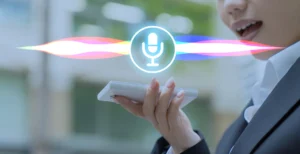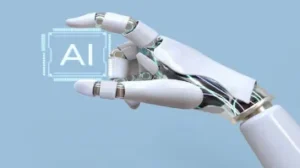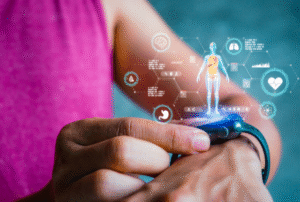AI in Your Smartphone
Artificial intelligence has become a key component of smartphones that many people use regularly. If you’re using voice assistants such as Siri and Google Assistant or relying on the predictive text feature on your phone, AI is constantly making itself available. These systems study your habits as well as your preferences and speech patterns to provide more customized responses. From autocorrecting text messages to telling you the next word to type as you write, AI can be found behind the scenes, improving your communication. Face recognition technology that allows you to unlock your phone’s capabilities uses AI algorithms to detect the unique features of your phone. Every time you use your phone, be it browsing, texting, calling, or browsing, AI is helping streamline your experience.
AI in Online Recommendations
Another way that AI is integrated into your daily routine is via personal recommendations on platforms like YouTube, Netflix, Spotify, and even retail sites such as Amazon. When you watch a program and listen to music, these platforms track your preferences and then use AI to recommend similar material. This makes finding new products, shows, or songs easier than ever before. AI systems learn from your previous habits and continuously improve their recommendations to be more suited to your tastes. While you aren’t aware, your shopping and entertainment experiences are created by machine learning algorithms running behind the scenes.
AI in Social Media Feeds
Social media platforms heavily rely on AI to filter the content that you see on your feed. Facebook, Instagram, Twitter, TikTok, and others make use of AI-driven algorithms to determine which posts, ads, and videos are the most interesting to you. They evaluate your interests, shares, comments, interaction time, and watch time to determine which content is most likely to keep you interested. This is the reason that your feed on social media appears personalized to your preferences and habits. AI also powers facial recognition functions for tagging images, regulates content to prevent inappropriate posts, and even recommends friends. These features can make social media more interesting and more personalized.
AI in Navigation and Maps
AI is a key factor in how we travel around the world. If it’s Google Maps, Waze, or Apple Maps, AI algorithms are working to offer real-time updates on traffic conditions along with route optimization and estimates of times of arrival. These apps collect huge amounts of information from sensors and users and analyze it to increase the accuracy and efficacy of directions. AI is also utilized in predicting traffic patterns and recommending alternatives to travel. Ride-sharing services such as Uber and Lyft make use of AI to pair drivers with passengers, predict waiting times, and create price changes dynamically. Every time you use these apps, you’re benefitting from AI technology.
AI in Smart Home Devices
AI powers smart home appliances in many households. These devices, like Amazon Echo, Google Nest, and smart thermostats, can take note of your habits and adjust settings in line with your behavior. They can regulate the temperature, lighting, and even security functions, typically using simple voice commands. With time the devices become more adept at recognizing your routines and preferences, which makes your home more relaxing and efficient in energy use. AI is also employed in smart appliances like refrigerators that track food inventory and washing machines that select the most efficient settings. These are technologies designed to make your life easier through learning and then adapting according to your requirements.
AI in Banking and Finance
Banking has become more intelligent and more secure due to AI. When you sign in to the mobile app of your bank as well as its website, AI can be used to identify unusual behavior that could be a sign of fraud. There are chatbots too that assist you with your queries and in transactions all hours of the day. A majority of financial apps make use of AI to monitor your spending, establish budgets, and recommend ways to reduce costs. Robo-advisors powered by AI are becoming increasingly popular in managing investments, providing individual advice on portfolios with little human involvement. Through analyzing trends in the market and the behavior of customers, AI is changing the ways we deal with finances and assisting us to make more informed financial choices.
AI in Healthcare and Fitness
AI transforms fitness and healthcare in subtle yet meaningful ways. Health apps that track your steps, monitor your heart rate, or track your sleeping routines are all driven by AI. These apps evaluate your day-to-day activities to give you personalized health-related insights and advice. Chatbots can use AI in virtual health consultations to diagnose symptoms and recommend remedies. Wearable devices can use AI to notify you of potential health problems before they turn dangerous. At hospitals, AI helps doctors by interpreting the medical image, diagnosing ailments, and suggesting treatments. Although you might not be able to see it in person, AI is working behind the scenes to improve your health and well-being.
Conclusion
Artificial intelligence isn’t only a futuristic idea; it’s a feature of our everyday lives in a variety of ways, more than we think. From the phones that we carry around to the intelligent devices that are in our homes, AI is quietly improving security and convenience as well as entertainment and health. It is changing how we shop, navigate, communicate, and make choices. As AI grows and improves, it will become more integral to our daily lives with the intention of working behind the scenes to make our lives more efficient and more efficient. Understanding the daily uses of AI allows us to appreciate the potential of AI and the ways that it’s creating our world.
FAQs
1. What exactly is AI? And how will it impact my everyday life?
AI, also known as artificial intelligence, is a term used to describe machines that mimic human intelligence in order to accomplish tasks and develop in time. It impacts your everyday routine through personalized recommendations as well as voice assistants, smart home appliances, and more.
2. Is AI safe to use in everyday applications?
It’s true that AI can be considered to be safe, particularly in consumer devices such as phones and apps, as well as smartphones. It is important to be aware of privacy options and the way your information is utilized.
3. How does AI recognize what I want or require?
AI is able to learn from prior actions, like your searches, purchases, browsing, or shopping patterns, to predict what you’ll like or need in the near future. Data analysis and machine learning algorithms accomplish this.
4. Do I have to be tech-savvy in order to profit from AI?
You don’t need to be tech-savvy to benefit from AI. Most AI-powered apps and tools aim to be user-friendly. You can benefit from AI whenever you utilize navigation apps, play suggested videos, or ask your voice assistant questions.
5. Can AI improve over time?
Indeed, AI systems learn and improve through interaction and data. This means that their suggestions as well as their responses will improve the more you utilize them.




